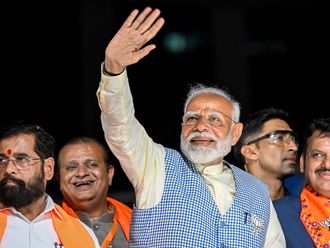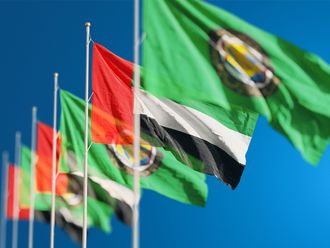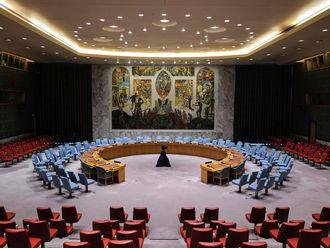Last Thursday, Rashida Tlaib made history and a day later she made headlines — history, for being the first Palestinian American to be sworn into the United States Congress as a freshman member of the House of Representatives; and headlines, for telling a crowd of liberal activists that “we’re gonna go in there” to impeach the president of the US. Except she used a pungent term, not printable in a family newspaper, to describe the sitting chief executive in the White House.
Sure, it caused a stir in America’s national media, especially because Rashida later refused to apologise, instead brashly commenting that “Trump has met his match”. Other celebrities before her had used equally scandalous four-letter words to dismiss the president, most notably last June at the Tony Awards, when the actor and two-time Oscar winner Robert De Niro took the stage and declared: “I’m gonna say one thing”, then used a profanity to cuss out President Donald Trump. At the time, the president responded by calling De Niro a “low IQ individual”, just as he last week called Rashida “disgraceful”. And that was that. End of story.
The inconvenient truth about Rashida, however, is her politics, or more precisely her views on the Palestine conflict. The feisty 42-year-old native of Detroit does not, you see, support the two-state solution, having long since walked back on that position earlier in her political career. Though not by any means a one-issue politician — she has constituents with more pressing concerns than the direction of American foreign policy in the Middle East — she made clear in speeches on the campaign trail and in interviews with reporters, when asked about the conflict in her ancestral homeland, that half a century of relentless occupation and colonial rule there had eroded the bedrock principles that defined the contours of the two-state solution, and it was time, essentially, for historic Palestine to be reconstituted as historic Palestine.
That ticked off the self-styled left-wing Israel lobby, JStreet, that had initially backed Rashida’s campaign, but upon reading of her retrenchment on the subject withdrew their support, claiming haughtily that “we do not endorse candidates who do not endorse the two-state solution”. To these folks, the one-state solution is “code for the destruction of Israel”.
Irony of ironies
To be sure, Rashida’s argument does not deviate from or add much to the one other apostates of the two-state solution: Israel’s expansionist policies in the Occupied Territories, aided and abetted directly or indirectly by the US, have made the idea of the two-state solution unworkable and the idea of the one-state solution the only viable, indeed inevitable, game in town.
Since the new administration took office in Washington, Israeli supporters — emboldened by a Republican Party that in 2016 declared in its political platform that it “rejects the false notion that Israel is an occupier” — have launched a campaign in the US to insinuate three “big lies” into the public discourse. A big lie, as is well-known, is an insidious type of mendacity, invented by Nazi propagandists, who were convinced that if you spread a lie around that is way too colossal in scope, then people would not assume, for a moment, that anyone could be so impudent as to subvert the truth so outrageously.
The lies in this case? There is no such thing as an Israeli occupation, there is no such thing as Palestinian refugees — by definition no such thing as a Right of Return — and there is no such thing as occupied Jerusalem, since the Holy City is Israel’s “eternal capital”, and look, even the US recognises that “fact”.
Meanwhile, Israel continues to maintain effective control of the whole of Palestine, from the Mediterranean Sea to the River Jordan, where roughly six million Jews enjoy full citizenship rights and an equal number of Arabs are denied similar rights. That’s apartheid, and with apartheid, something, somewhere along the line, must give.
Thus the mass sentiment in Palestinian society, whether expressed by Palestinians under occupation or in exile, has shifted from a demand for two independent states to a bi-national one. And that sentiment is becoming increasingly popular among progressive Europeans and Americans who view Palestinians as the injured party in this dispute.
And, so, what if Rashida Tlaib, the feisty daughter of working class Palestinian immigrants, who grew up in a gritty Detroit neighbourhood, cussed out the most anti-Palestinian American president in memory at a victory reception held for her at a saloon close to Capitol Hill, where uttering a profanity is de rigueur, flaunting convention is cool and being another member of a new generation of Democratic lawmakers, raring to go, is chic?
Fawaz Turki is a journalist, lecturer and author based in Washington. He is the author of The Disinherited: Journal of a Palestinian Exile.












